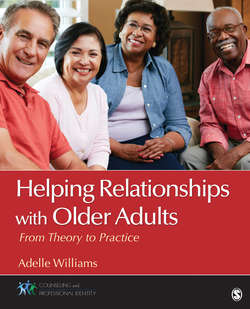Читать книгу Helping Relationships With Older Adults - Adelle M. Williams - Страница 72
На сайте Литреса книга снята с продажи.
Mental Wellness
ОглавлениеThe term mental wellness is used to reflect the belief that health and illness are not dichotomously arranged in nature or in life and because people can, in collaboration with knowledgeable helpers, move along the continuum toward optimal wellness at each stage of life by their own efforts. People have more options than to be sick or healthy. They do not have to be sick to improve wellness. This is an especially important outlook for aging as a process—people can have an array of illnesses as they age yet still enjoy wellness and a good quality of life.
Feinberg’s (2001) work added another layer of richness to the analysis of how “the self,” as a unifying perpetually created process of the brain, is a lifelong process. He shed importance on the intricate, fluid, lifelong nature in which the holistic nature of mind–body unity are demonstrated throughout the life span. Mental wellness is important, but it is not intended to be ignorant of the fact that frailties, problems, and dependencies may exist for some aging individuals. However, there exists a need to focus on the strengths of aging persons throughout their development.
Older adults are generally challenged to create a positive sense of their lives as a whole. The feeling that life has had order and meaning is expected to result in happiness (ego-integrity) (Erikson, 1986). Older adults must adjust to decreasing physical strength and health. Thus, older adults might be confronted with life situations that are characterized by not being in perfect health, serious illness, and dependency on other people’s help. Moreover, older adults also have to adjust to the death of their spouses; this task arises more frequently for women than for men. After having lived with their spouses for several decades, widowhood might force older individuals to adjust to emotional states of loneliness, moving to smaller places, and learning about business matters. Having an optimistic outlook on life can help older adults cope with and compensate for these adjustments in healthy ways and continue on their path to successful aging. Guided Practice Exercise 3.2 will help counseling professionals identify factors integral to successful aging. These factors can be integrated into the therapeutic sessions to promote and improve the quality of life for older clients.
Guided Practice Exercise 3.2
Interview an older woman and investigate her perception of successful aging. Compare her responses to those factors identified in the chapter. What similarities and differences have been identified? What do you feel constitutes successful aging?
